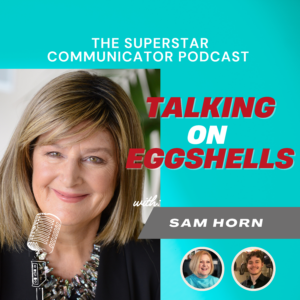We all want to make a positive impact in all conversations – don’t we! We were treated to a masterclass with Sam Horn on this topic. From this, we have created 5 tips and you can listen to the podcast episode in the link below.
1. Master the First 60 Seconds: When presenting or pitching, focus on getting people’s eyebrows up, winning respect, and generating buy-in. Craft a concise and attention-grabbing opening that highlights the issue and introduces your solution. Instead of faffing around, grab the attention of the audience from the word go; intrigue them; raise their curiosity; demonstrate why they should be interested.
2. Address Objections and Resistance: There are often occasions when people don’t agree with our opinion or what we have to offer. Whether you are pitching an idea; sharing an opinion or even answering a question, there is always the possibility that someone will object or resist! Anticipate and address objections to counteract resistance. Use language that avoids conflict, offers solutions, and takes less time than expected to earn trust and respect. Understand the decision-maker’s perspective and be considerate of their time.
3. Set Boundaries and Say No: An essential skill we share with clients at all stages of their career is knowing how to set boundaries and say no in an assertive, respectful way. Unless you are able to do this effectively, you risk burnout, resentment and also not being taken seriously. Practice the conflict style of aversion by calmly and professionally setting limits and communicating needs without shaming or ordering others.
4. Use Warm Authority and Professional Language: Convey leadership and inspire trust by using warm authority and professional words.In the world of SuperStar Communicator, we talk about Ding Dong words: words that are weak and undermine your credibility. Instead use words and phrases that undermine you; use impactful words.
5. Make an Impact with Introductions: Introduce yourself effectively by saying your name with a pause and a punch: metaphorically, not physically! Points such as “I love your dress”; “I’ve heard so many good things about you” or “Tell me something about yourself” – will start a great conversation. It is a tip so useful in all areas of conversations.
Remember, these tips are a summary of the episode content. I highly recommend listening to the full episode for a comprehensive understanding of the techniques and insights shared.


